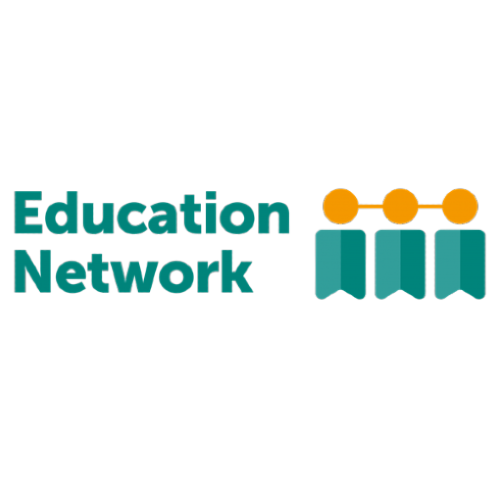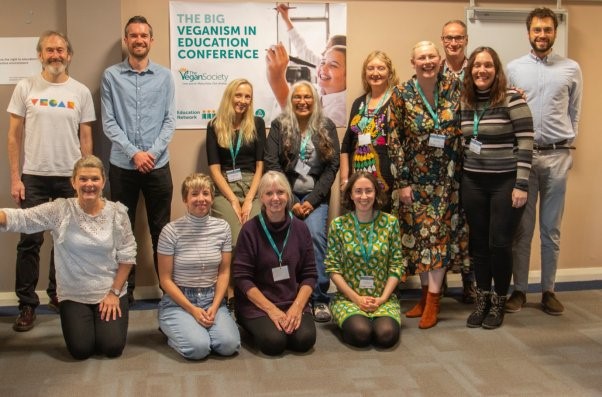"Inclusive education is beautiful and vegan learners should not be excluded from the benefits of such a wonderful concept.”
Laura Diamond, Education Officer and Chair of The Vegan Society’s Education Network

The Vegan Society’s Education Network fulfils two main aims:
- To support educators and those invested in the development and well-being of their vegan learners from the Early Years through to Higher Education. This is achieved by creating, developing and providing age-related teaching and learning resources and information and guidance, all of which inform our continuing professional development (CPD) accredited, vegan-inclusive staff training and consultancy.
- To support vegan learners and their families when asking for vegan inclusion by acting as an intermediary between them and their institution. This is achieved by empowering vegan learners and their families by informing them of their rights and, if necessary and appropriate, lobbying on their behalf.
The Vegan Society's Education Network is a community of educators and individuals who are passionate about promoting veganism and providing resources and support for vegan education. This network primarily consists of vegan teachers, school staff, parents, and educational professionals who work to integrate veganism and related topics into various educational settings, from primary schools to higher education institutions.
Members of the Vegan Society's Education Network collaborate to develop educational materials, lesson plans, and resources that can be used to teach students about veganism, plant-based diets, non-human animal rights, and environmental sustainability. They also organise workshops, conferences, and training sessions to help educators effectively incorporate vegan perspectives into their teaching.
Vegan-inclusive education not only encompasses the comprehensive understanding of veganism but also acknowledges it as a protected characteristic that schools should accommodate under the public sector equality duty.
As a protected characteristic, veganism is on par with other characteristics such as race, religion, gender, and sexual orientation. Schools are required to ensure that vegan learners are not subjected to discrimination because they are vegan. Avoiding discrimination extends to ensuring vegan options are available in school cafeterias and that vegan learners do not miss out because educational activities are not inclusive, including trips and events.
Moreover, the public sector equality duty requires schools to proactively work to eliminate discrimination, advance equality, and foster good relations. These measures must also benefit vegans. This considering vegans in anti-bullying policy, curriculum development, and staff training, promoting a respectful and empathetic atmosphere.
Vegan-inclusive education, therefore, combines the educational aspect with the legal and ethical obligations of schools to accommodate the needs of vegans. It not only seeks to raise awareness and understanding of veganism but also ensures that the rights and values of vegan learners are protected and respected within the educational system. By recognising veganism as characteristics and considering the needs of vegans in terms of public sector duties, schools play a pivotal role in fostering a more inclusive and equitable society, where individuals are free to express their beliefs and lifestyles without fear of discrimination.
Our purpose

Following the Equality Act 2010
Ethical veganism is a ‘protected characteristic’ for the purposes of the Equality Act 2010. It is unlawful to directly or indirectly discriminate against ethical vegans and the Public Sector Equality Duty requires schools to routinely integrate inclusive thinking and equality into everything their institution does. In our experience a lot of educators are unaware of this duty or do not understand its relevance to veganism. We also know that a lot of educators don’t know what it means to be an ethical vegan. As a result, the needs of vegans in education are not met.
Providing useful resources
We wish to rectify that by providing useful resources that offer hints, tips, and tweaks, and share alternative teaching methods that educators can adopt to simply introduce vegan inclusion into their existing inclusive practice framework.


Encouraging vegan-inclusivity to be an everyday practice
Becoming vegan-inclusive in your everyday practice can also be of benefit to the wider cohort as well as the vegan children. Veganism promotes good health, environmentally friendly initiatives, and compassion for all.
CPD Accredited Training Enquiry Form
The Education Team at The Vegan Society is delighted to offer CPD Accredited training for education staff nationwide in the UK. If you are keen to arrange this free training for your educational institution, kindly complete our enquiry form.
Enquire about CPD Accredited training
Resources
How can we help you?
Please visit our resources webpage to find our Guide for Educators and downloadable template letters to assist you in asking for vegan-inclusive practice in education.
- If you have concerns prior to your child starting in a new Key Stage of their education
- Worries about a future learning experience or learning environment
- Your vegan school meal option, school menu and/or appropriate nutritious food
- Chick/duck/butterfly hatching projects
- School curriculum
- Feeling unsafe or discrimination
- Upcoming trips unsuitable for vegans
- Teachers and educators require training on vegan inclusion
- You are part of school staff and your vegan beliefs are not taken seriously
- Information on your rights and legal requirement of your institution
- You are a transitioning vegan learner/student and would like support
- You are a vegan parent, vegan guardian or vegan family who require support
A little bit about our Education Officer, Laura Diamond
Laura's journey began with a degree in Primary Education, followed by a rewarding decade of teaching and a brief stint as an SENco (Special Educational Needs Coordinator). Not long after, Laura embarked on an exciting path, conceptualising vegan-inclusive teaching in an educational context and publishing 'An Educator's Guide for Vegan-Inclusive Teaching.' She then became the UK's pioneering vegan inclusion education specialist before joining The Vegan Society.
At The Vegan Society, Laura is dedicated to helping educators by creating valuable resources and facilitating CPD accredited training sessions, empowering them to seamlessly incorporate vegan inclusivity into their daily teaching practices.
Furthermore, she assists parents and guardians in advocating for vegan inclusion by collaboratively developing documents along with The Education Network. Laura is committed to making education more welcoming and inclusive for all, one step at a time!
Additionally, Laura also plays a crucial role in supporting vegan learners who claim to have been unfairly treated or discriminated against at any Key Stage within education, and acts as a bridge between these learners, their families and the educational institutions.
The BIG Vegan Inclusion Education Conference 2022
Members of The Vegan Society's Educational Network, a dedicated group of vegan professionals, and members of the International Rights Network came together to address challenges in vegan-inclusive education. They shared their experiences as educators, parents, guardians, and learners, highlighting how equality and inclusiveness principles can be applied to vegans whose ethical views are protected by law.
We're thrilled to report that our speakers from the education sector made this event truly special. You can find the full list of remarkable speakers on our speaker page.
Throughout the event, a wide range of topics were covered, including how traditional educational resources can be enhanced to promote compassion for nonhuman animals, the integration of vegan inclusivity in extracurricular activities and school trips, and the provision of vegan food and plant-based milks, among many others.
For more detailed information, be sure to download The BIG Veganism in Education Conference PDF. Thank you for being a part of this remarkable milestone in vegan-inclusive education!

Please email [email protected] for assistance with any of the above and any other requests.


